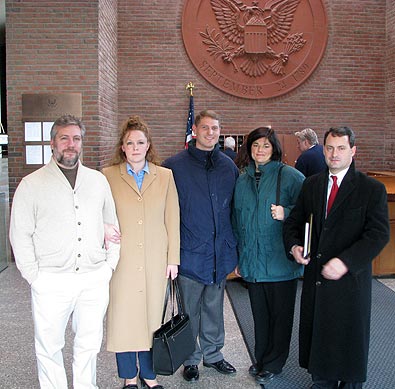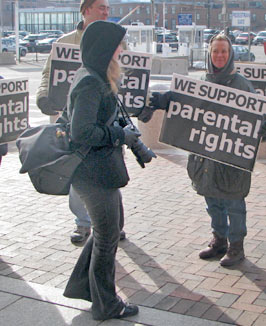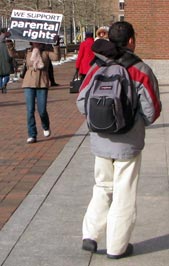| |||||||||||
|
David Parker federal civil rights appeal heard before 3-judge panel in Boston Federal CourtBoth sides looked weak and disorganized under judges' tough questioningHearing takes less than an hour in packed courtroomBOSTON, MASSACHUSETTS (DEC. 5, 2007) The appeal hearing for David Parker's federal civil rights lawsuit lasted less than an hour this morning, and both sides seemed to be taken by surprise by the tough and thorough questioning by the three-judge panel. The Lexington School System and their allies in the homosexual legal community want the appeal to be denied. They do not want this to be allowed to go to trial. The Parkers and Wirthlins want to take their case to court. The hearing began at 9:30 am in Boston Federal Appeals Court before Judges Norman H. Stahl, Sandra L. Lynch, and Jeffrey R. Howard. The courtroom was so packed that the guards stopped letting people in within minutes after the hearing started. Many from the homosexual and left-wing legal community were in the room, as well as homosexual news outlets and a few prominent activists.
The format was: a lawyer for each side was given 15 minutes to state his arguments for or against the appeal, plus some additional time to answer questions from the judges. However, the judges did much of the talking, asking questions and dissecting the answers from the lawyers. Judge Lynch directed most of the conversation, though Stahl and Howard also contributed.
The hearing ended after approximately 50 minutes. Each side has been given ten days to submit a final brief before the panel makes its decision. Judges were well preparedThe judges were very impressive, more so than at any other Parker court appearances. It appeared that these judges had not only read the briefs carefully but had a better knowledge and understanding of the case law involved and some of the pertinent issues than the lawyers! They had also apparently researched the state core curriculum as it applies to this case. Both lawyers seemed unprepared for the hard questioning. And both, in our opinion, lost ground as a result. The school's lawyer, John Davis, was particularly taken by surprise; he had apparently expected an easy morning of skating through by bringing up cherry-picked case law and left-wing "diversity" arguments. This was a stark contrast to the Feb. 7 hearing with Judge Mark Wolf, who afterwards dismissed the case and wrote an outrageous brief extolling the "rights" of the schools over the parents. From his questioning, Wolf appeared to have only a cursory knowledge of the case law being brought up, and little understanding of the overall issues. Of course, there is still a certain Alice-in-Wonderland quality to the very concept of a federal court carrying on a rational discussion of the legal pros and cons regarding normalizing homosexuality to elementary school children. A quarter century ago anyone would probably have been considered mentally unbalanced to even suggest such an idea. But we're here -- in 2007 -- so we'll have to make the best of it. The plaintiffs present their case firstRobert S. Sinsheimer, representing the plaintiffs, the Parkers and Wirthlins, presented his arguments first. He told the judges that the Parkers and Wirthlins want to be part of a diverse community, but that they believe marriage is only a union between a man and a woman, and the school system has chosen to teach the children the opposite. The book King and King - which features two men in a romantic relationship and kissing - is most offensive, but it is only part of the larger issue. The Parkers want to opt their children out of these kinds of books and similar issues, but the schools won't allow it. He said that the schools are, in essence indoctrinating kids using a political movement "that's very capable of advancing its agenda. . .They are indoctrinating the children out of their own faith." Judge Lynch asked Sinsheimer, "What is the infringement of the free exercise rights? There's nothing here which would preclude the parents from teaching their beliefs to their kids." "A teacher is a very powerful authority," he replied. And moreover, since there is no prior knowledge, "their children might be indoctrinated into something the parents might not even know about." Lynch agreed, and observed that this also could happen "before the parents are ready to discuss it." However, Sinsheimer did not suggest that maybe parents wouldn't want it discussed at all, ever. Lynch asked Sinsheimer, "As a practical matter, what would you have the school system do?" And how would one balance of the burden of the parents' rights versus the rights of the state, and the burden of the school system, she asked. Sinsheimer that he had "struggled with that question" and that he felt it would be "administratively difficult". That was a very disappointing answer and, interestingly, even the judges later disagreed that it should be difficult to administer. He added that "people of good will" should be able to work this out, but that educators have to realize that some of what they're doing is going to be inflammatory -- and which members of the community could find this offensive. But Sinsheimer didn't go on with his answer to say that the schools must notify the parents and allow them to opt out when teaching these particular subjects, as the Parkers requested and as many other schools do. Sinsheimer then said that these books and topics were not part of any official state curriculum, but essentially ad hoc. Judge Stahl mentioned that the state curriculum guidelines mandate the promotion of "diversity". Sinsheimer agreed, but said that the problem is in this school's interpretation of what diversity actually is. Lynch asked him about the current Massachusetts parental notification law. Doesn't the state law cover your client's situation? Why are we addressing a constitutional claim if state law covers it? Why are you in federal court? Why do we need to go to federal law? Sinsheimer did not have much of an answer. He said that the federal constitution has the free exercise clause, which gives greater protection on religion. He could have described how the Lexington schools and the Superintendent are ignoring the state law by changing the meaning of its plain language, that the State Department Education (which is supposed to enforce the law) is supporting that approach, and that the law is now too weak to protect parents anyway, since it was written before homosexuality was a serious issue in the schools.
The defendants make their caseJohn Davis, attorney for the school system started out by saying that since this case is the same as the Brown case (Suzi Landolphi - "Hot, Sexy, and Safer" - Chelmsford in 1992), no new set of facts can be developed that would help the plaintiff's case here. Therefore, there's no reason to have a trial. That's about as far as he got. Judge Lynch stopped him, saying that since he had made the "Brown" argument in the briefs, it wasn't necessary to repeat it here. Judge Lynch told Davis that she was interested in a discussion about:
The plaintiff's use of the of the Brown case did take a beating by the judges. Stahl said that the difference in ages in Brown is definitely an issue. The Brown case involves high school students, and this involves elementary school students. Lynch added that it's not irrational that you would have different standards for different ages since the state uses different curricula for high school and elementary school. Moreover, regarding free exercise of religion no legal case has ever said that age makes no difference, she said. Lynch also brought up the Smith decision, another case used by Davis in his briefs, and questioned whether it was really relevant. There seemed to be an issue of which part of the Constitution this really addresses - free exercise of religion or the establishment clause. Davis didn't challenge her on this. Lynch added that the 6th Circuit Court drew the line when someone must affirm religious beliefs that are not their own, or deny their religious beliefs, which would apparently trump some of the case law Davis used. Also, Davis brought up his argument that this was simply the town's policy attempting to enforce the state principles, outlined in the state curriculum guidelines, encouraging the teaching of "diversity and tolerance." At that point Judge Lynch mentioned King and King again. "Are these books consistent with the 'diversity and tolerance' outlined by the state?" she asked. Then Judge Stahl asked: Why isn't it a problem when the school goes beyond the state mandate on diversity & tolerance? Is anyone checking this out with the state? Is King and King preaching a doctrine? Why was the book chosen? Davis tried to defend it by saying that these kinds of choices by a town are not a problem of constitutional magnitude. Such a choice is merely "political and pedagogical," he said. "So bad decisions get made and that's the end of it?" asked Judge Stahl. "The Parkers can get involved in the political process, electing members to the school committee for example," Davis said. "Does it make a difference that they seek just an opt-out?" Lynch asked. "The plaintiffs insist they're not trying to remove books from schools. They want opt-out." No, it makes no difference, said Davis. Then he talked about how accommodating parents in this way would be an "administrative nightmare." "But why?" asked Lynch. "The schools already have to do this to accommodate the sex ed law." Davis said that this is different because it would affect "all areas" of the curriculum. No, said Lynch. Just a very particular part of the curriculum. Why is it impossibly burdensome to do the same with this as the sex ed law requires, she asked. Judge Howard then asked, "Should there be facts developed on the nature of burden on the school system?" (This is something a trial would bring out.) Davis vehemently disagreed. He went back to his well-worn "the Parkers want to dictate the curriculum" argument: "Once you get rights to dictate curriculum, it infringes on rights of schools, intrudes on academic freedom, first amendment rights of students. . ." he said. But Judge Lynch wasn't buying it: "You're going to a very broad foundation. This is narrow." That was it for the oral arguments. It looks like the judges are taking this pretty seriously, and not cutting the lawyers much slack. As mentioned above, both sides each have ten days to submit a final brief. Some reaction by the leftExcept for the homosexual newspapers and the Associated Press, this hearing attracted surprisingly little interest by the Boston media, even though it was well publicized. However, State House News was there and picked up a few interesting comments as people were leaving. Kevin Bott, Lexington's town counsel, told State House News on allowing parents to opt their children out, "We think it would be an administrative burden of great magnitude." Also, he said, allowing parents to remove children from a potential discussion would stigmatize other children. Meg Soens, a Lexington lesbian activist who has worked with GLSEN agreed that allowing parents to opt out their children from homosexual programs would send a message about homosexuality, therefore it shouldn't be allowed. "They'll feel something's wrong with us," she told State House News. Sarah Wunsch, staff attorney for the American Civil Liberties Union, told State House News that the courts have said parents have the religious freedom to not send their children to school, but once they do, the Constitution doesn't allow them to order around the curriculum. In other words, the same old party line. We'll keep you up to date on everything.
What would a public event involving parents rights be without a homosexual newspaper covering it? Left, a photographer for Bay Windows. Right, the ever-present Bay Windows reporter. | |||||||||||
|
|||||||||||






